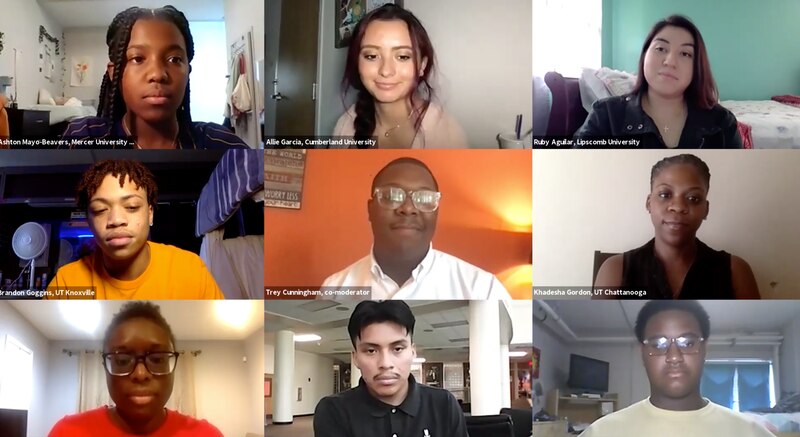William Collins remembers exactly where he was last semester when his college, Fisk University, announced it was stopping in-person classes due to the coronavirus.
“I was in the middle of a U.S. History lecture,” Collins said, now a junior at the historically Black university in Nashville. “To get that notification really shook me. We had to find a way to put everything online, and that didn’t always go well.”
The coronavirus has heightened inequities within higher education, disrupted campus life, and put a financial strain on many families. Chalkbeat and The Education Trust in Tennessee held a series of student roundtables this month to hear from students directly, and Collins was one of eight college students to participate.
Collins and his fellow student panelists are back on campus this fall, but many are still taking classes virtually. While he said this semester is off to a much better start, Collins implored professors to think about all the stressors that students face.
“A lot of professors are getting upset because they think we’re slacking,” Collins said. “Honestly, I’m just tired of looking at a screen all day every day. I need you to help me, so I can help you … You have to be patient with me in the same way I have to be patient with you.”
Several of the student panelists spoke of increased workloads compared with last semester, while freshmen talked about the struggles of starting this life stage during a global pandemic.
College students can have major responsibilities outside of school like work and kids that professors aren’t adjusting for during this time, said Khadesha Gordon, a student at the University of Tennessee, Chattanooga.
“I’m a single parent,” Gordon said. “A lot of times, administration forgets about students like me who have children they support or don’t live on campus. My 2-year-old daughter’s school is shut down, too. It’s very hectic right now.”

Professors shouldn’t be assigning huge workloads and should be inviting students to virtual office hours where they can talk about stress and mental health freely, said Brandon Goggins, a freshman at the University of Tennessee, Knoxville.
While some of the students talked about the difficulty of staying focused online, others detailed the fear of going to class in person every day.
Ashton Mayo-Beavers, a Chattanooga native who is starting her first year at Mercer University in Georgia, only had the option of in-person classes. But she wishes her campus had offered a choice.
“Every day you have to trace who you are hanging out with and think about if you stayed 6 feet or if you took your mask off once,” Mayo-Beavers said. “It’s like I’m torn between my health and keeping everyone else safe versus trying to get my education and get an A on that calculus test.”
Freshmen also face the challenge of starting college without the usual access to professors and counselors, said Mateo Francisco Andres, in his first year at Pellissippi State Community College in Knoxville.
“It’s difficult not knowing where to find your resources or how to find the right time to reach out to your professors,” he said.
On top of the pandemic stress, students also talked about the climate on their campuses around race and inequity. Some students had participated in protests this year advocating for racial justice, while others mentioned racist incidents that they have already experienced this semester on campus.
“I would want my college leaders to know that adaptability for students looks different depending on where we are,” said Gordon after talking about the microaggressions she’s experienced as a Black student. “The entire world has been impacted by the pandemic, but some students have other things they’re struggling with.”








